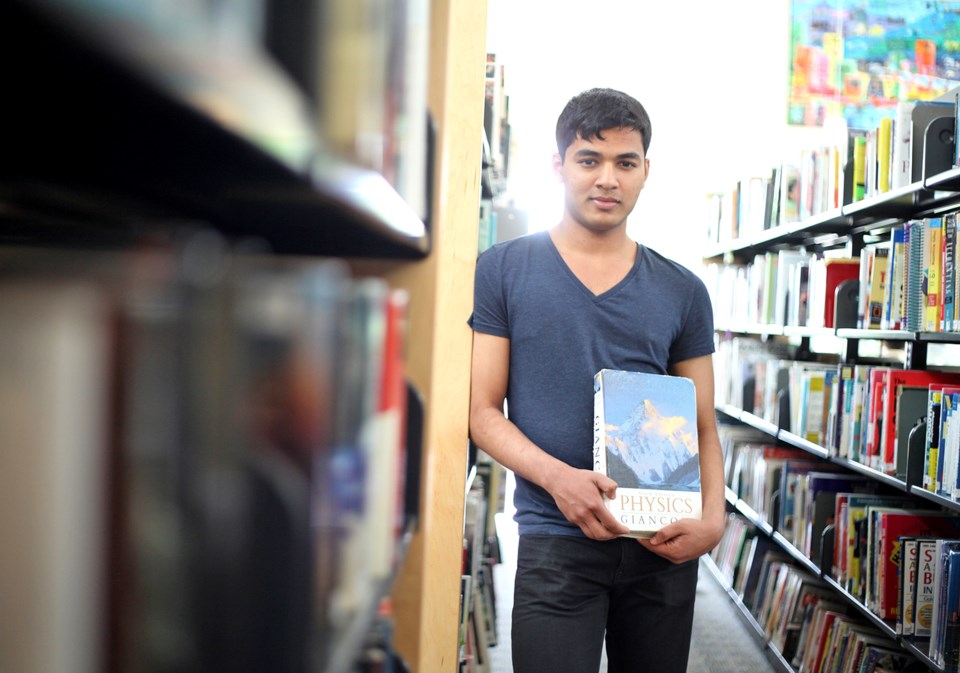Burnaby teen Pasindu Muthukuda is grappling with some big problems.
As one of the top five high school physics students in the country and the only Western Canadian to qualify for the 45th International Physics Olympiad in Kazakhstan this summer, he will spend the next two months practising problems designed to shed light on the very nature of the universe – space, time, matter, motion, energy and force.
He will also be trying to figure out how to pay for his plane ticket.
Muthukuda, a 16-year-old who graduates from Burnaby Central this month, qualified for the International Physics Olympiad July 13 to 21 with a top-five score on the Canadian Association of Physicists exam in April.
In the past, that would have earned him a free trip to the Canadian Physics Olympiad, a weeklong physics camp and competition for the country’s top 15 young physicists – five of whom would have been chosen and funded to represent Canada at the prestigious international competition.
But after decades of bringing together the country’s best and brightest young physicists, the national event was cancelled this year because of a lack of funds.
Canada will still have a team in Kazakhstan as organizers decided to send the five students with the highest scores on the Canadian Association of Physicists exam.
But the cancellation of the national event means they will miss out on valuable practice with experimental problems, which make up 40 per cent of the international contest.
“We need the opportunity to prepare the students for that,” Muthukuda said, adding Canadian high schools tend to focus mostly on theoretical problems in physics classes.
UBC took over the Canadian Physics Olympiad three years ago after the University of Toronto decided it could no longer afford to fund it.
“We got some money in the last two years but never enough to keep it fully going, and then we went bankrupt,” UBC physics professor and director of the Canadian program Andrzej Kotlicki told the NOW.
He has been involved with the International Physics Olympiad for about 45 years – 25 in Canada and 20 in Poland, the country that hosted the very first event in 1967.
He’s a big believer in the competition’s benefits.
“For the students, it’s amazing benefits,” he said. “For the first time in their lives very often, they meet the students who are better than they are or the same level. They create the contacts, which stay for life usually. For the people leading it, it’s also an occasion to compare the science programs in different countries. So I think it’s a big deal that we cannot afford it.”
UBC puts an estimated $15,000 in in-kind contributions into the national program, Kotlicki said, but other funding – from physics departments at other Canadian universities, from the Natural Sciences and Engineering Research Council (NSERC) and the private sector – has dried up.
Considering $35,000 a year is all it would take to keep the program going, Kotlicki said that’s not a good omen for the future of Canada’s knowledge economy.
“The issue is, is our future based on development of science and technology or not?” he said. “Anything which promotes and encourages the best of the best, I think is very important for the country.”
He said failing to support programs like the Canadian Physics Olympiad will have long-term consequences, but he isn’t hopeful those far-off effects register on the radar of today’s politicians.
“I think we will still be a raw-resources developing country rather than intellectually developing country,” he said, “but the consequences of that are very long term. We’re talking about kids who are in high school now, so will achieve something important for the country in maybe 20 years or something like that, so from the point of view of our average politicians it’s not important because they will be out of office by then.”
For Burnaby’s Muthukuda, meanwhile, the cancellation of the national physics competition and camp was a bit of a double-edged sword.
He’s missing out on valuable practice with experimental problems and a chance to get together with 15 of the smartest physics kids in Canada.
But he also knows he could have been bumped from the international competition during what has traditionally been the final tryout for the Canadian team.
He estimates he will now spend about four hours a day and twice that on weekends practising for Kazakhstan.
“For the next two months I’m focusing most of my energy and free time on that,” he said.
His goal is to bring home a medal. Medals at the International Physics Olympiad are awarded on a percentile basis, with the top eight per cent winning gold, the top 25 per cent silver and the top 50 per cent bronze.
Last year’s Canadian team brought home one silver and two bronze medals.
Does Muthukuda have what it takes?
“After spending only a couple of hours with him, I cannot say,” said Kotlicki, who is helping to prepare the youngster for Kazakhstan. “The important thing is that he is very very involved, very eager to do it, and of course he did extremely well on the CAP exam, which got him here. I can tell you now that he is one of the top five students in the country.”
To support Muthukuda’s trip to the 45th International Physics Olympiad in Kazakhstan, contact Burnaby Central Secondary at 604-296-6850 or donate online by visiting the school’s website at central.sd41.bc.ca and clicking the School Cash Online button.



